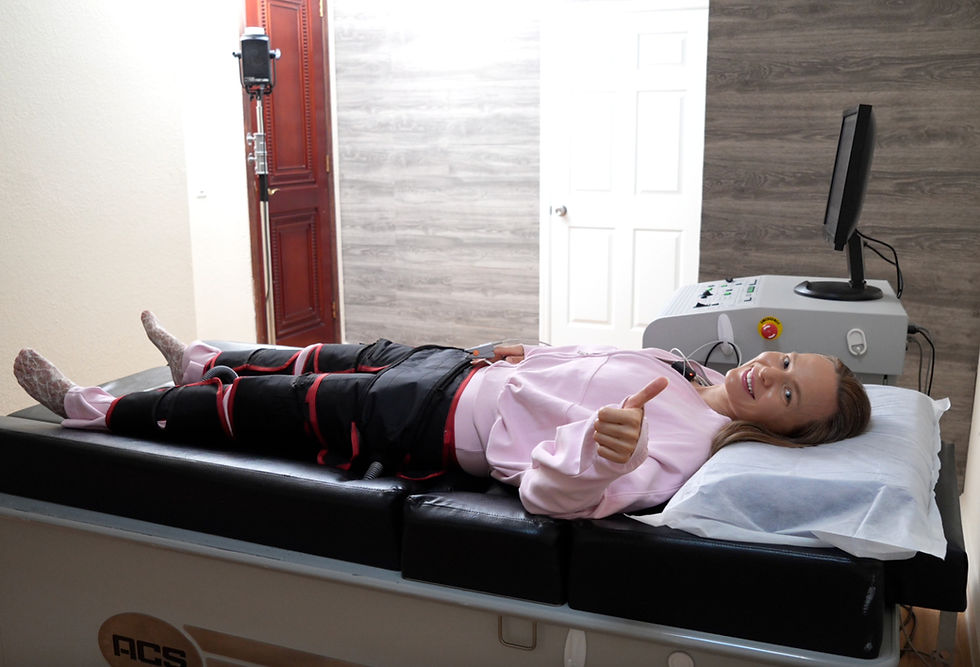Empowering Women to Thrive Through Perimenopause & Beyond
- Apr 17, 2025
- 4 min read

Perimenopause marks a profound shift in a woman’s physiology, often beginning in her late 30s to early 40s—even while regular menstrual cycles continue. One of the earliest and most defining changes during this transition is a gradual decline in progesterone production. This occurs because women are born with a finite number of eggs, and unlike sperm-producing testes, the ovaries do not regenerate or replenish over time. As ovarian function declines, so does the production of key hormones like progesterone—even while estrogen levels may remain high or temporarily increase. This imbalance can lead to a state of relative estrogen dominance, a hallmark of early perimenopause.
What Happens When Progesterone Drops?
Progesterone is essential for calming the nervous system, supporting restful sleep, and stabilizing mood. Its decline can manifest in several ways:
Heightened anxiety or depression before menstruation
Poor sleep quality
Heavier, more painful periods
Breast tenderness
BloatingWeight gain or resistance to weight loss
At the same time, estrogen—while protective in many ways—is a growth-promoting hormone. In excess, or when unopposed by progesterone, it can exacerbate many of the symptoms women struggle to manage.
The Importance of the Progesterone-to-Estrogen Ratio
Hormonal balance isn't simply about absolute hormone levels—it's about the ratio between them. Progesterone and estrogen work in a tightly regulated feedback loop. When this balance is disrupted—due to stress, poor sleep, environmental toxins, or the natural aging process—it can trigger a cascade of symptoms often mistaken for “normal aging.” In reality, these are signs of hormonal dysregulation.
Hormonal Literacy = Personal Power
In a recent exclusive interview, Cynthia Thurlow, NP - globally recognized expert in perimenopause/menopause shared practical strategies to help women navigate hormonal changes with clarity and confidence.
Cynthia emphasized how lifestyle factors—like stress management, sleep quality, movement, and nutrition—deeply influence hormonal health.
Key Lifestyle Priorities for Midlife Women:
✔️ Manage stress
✔️ Prioritize high-quality, restorative sleep
✔️ Engage in daily movement (strength training, HIIT, or Zone 2 cardio)
✔️ Focus on anti-inflammatory nutrition
As Cynthia wisely noted: “We can’t eat like we did at 18 anymore.”
With declining estrogen—known for its anti-inflammatory and gut-protective properties—many women experience heightened food sensitivities and inflammatory responses. Gluten, dairy, sugar, and alcohol may become harder to tolerate. This often stems from increased gut permeability, or “leaky gut,” which can trigger systemic inflammation.
We also explored key supplements and hormonal interventions, including Cynthia’s own line, Midlife Pause™, developed specifically for women in midlife.
Here are a few of her foundational recommendations:
Creatine: Supports strength, bone density, sleep quality, and jet lag resilience
Vitamin D3 with K2: Enhances calcium absorption, immune support, and bone health
Magnesium: Vital for sleep, cardiovascular function, and stress regulation
Collagen (Marine & Bovine Blend): Supports joints, skin elasticity, and hair/nail strength
Fiber: Aids gut health and estrogen detoxification (most women consume less than the recommended 25–30g/day)
Inositol: Helps with mood, sleep, and blood sugar regulation; promising research supports its benefits for anxiety and OCD
Adaptogenic Mushrooms & Herbs: Boost stress resilience—Cynthia particularly highlighted ashwagandha (unless nightshade sensitivity is present)
Bioidentical Progesterone vs. Progestin: What’s the Difference?
Many women benefit from progesterone support during perimenopause and menopause. However, conventional medicine often prescribes oral contraceptives or progestin IUDs—solutions that are not true hormone replacement therapies.
Progestin is a synthetic compound that does not chemically match natural progesterone. As a result, it can interact differently with hormone receptors, sometimes leading to unwanted side effects like mood swings, bloating, or even worsening of symptoms.
Bioidentical progesterone, on the other hand, is molecularly identical to the hormone your body naturally produces. It binds to progesterone receptors more effectively, promoting restful sleep, reducing anxiety, and balancing estrogen's effects. Taken orally or transdermally, it’s typically better tolerated and more effective during perimenopause.
“Progesterone is the one with all the benefits. Our hormone receptors know what to do with it. Progestin is the synthetic version—it’s very different, not only biochemically but in how it interacts with the body,” Cynthia explained.
✨ Cynthia Thurlow, NP - Founder, The Midlife Pause™, host of the Everyday Wellness podcast.
Author and international speaker, with over 15 million views for her second TEDx talk (Intermittent Fasting: Transformational Technique).
With over 25 years experience in health and wellness, Cynthia is a globally recognized expert in perimenopause/menopause and intermittent fasting. Her mission is to help empower women to live their most optimal lives in perimenopause and beyond.
⚡️ Watch the full interview with Cynthia Thurlow, NP on our YouTube channel
Every woman deserves access to clear, accurate information about hormonal optimization. Hormones influence nearly every aspect of health, and understanding how to work with them—rather than against them—is key to making empowered, personalized decisions throughout life.
💫 Ultimate Wellness™ is committed to creating a space for sharing knowledge and expert opinions with our vibrant community.
We’re proud to feature Cynthia Thurlow, NP as a keynote speaker at the Ultimate Wellness Conference at Faena Forum in Miami Beach, September 26–28, 2025.
Cynthia’s keynote—“Menopause, Hormones & the Microbiome: Women's Health”—will inspire women not just to survive, but to thrive through this pivotal life stage.
Come meet Cynthia in person! Get your ticket now at a discount with promo code Ultimate20 at ultimatewellness.miami/forum
Sending Optimal Health & Ultimate Wellness,
Julia Smila - FDN Practitioner & Pranic Healer
_edited.jpg)




Comments